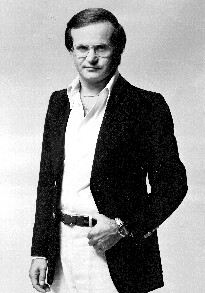
About MECO and his Music
- Intro
- Meco Monardo
- Disco: The music of the 70's
- Interview with Meco (October 99)
- Interview with Meco on "The Complete Star Wars Collection" (May 00)
In 1977, MECO's version of the Title Theme and the Cantina Band Theme of Star Wars reached #1 in the pop lists all around the world, and got Platinum for sales over 2 million copies (something that at that time was only attained by 100 other singles in the last 50 years of Pop music). Many producers thought that Meco's achievement was only due to the big commercial success of the movie, so versions of Star Wars music appeared by the thousands. They soon discovered that they were deeply wrong and none could even reach the lists. MECO's success was not only a matter of opportunity but also a great deal of originality and high quality production. In MECO's music you could find all the best of the dance music of the late 70's and much more.
Late 70's were the happy days of what
was called disco music or just disco. Among other influences,
Disco took up the rhythm and wind sections of funk bands and
added it to string orchestrations that started with The Sound of Philadelphia
in
the early 70's. A great combination that resulted in the more sophisticated
Disco
sound of the late 70's. Meco, who had already produced some of the early
Disco hits by Carol Douglas and Gloria Gaynor, thought that producing disco
versions
of orchestral music from the movies were the perfect playground for this
kind of sound. In my opinion, this is the real achievement of MECO. This
and chosing the right people to do the job, like Meco himself, Harold Wheeler
and Lance Quinn, among others.
However, disco didn't last
long. In the early 80's new music tendencies arrived that took up the dancefloors.
Unfortunately, MECO didn't survive that change and nobody has ever taken
his place.
Meco Monardo
what follows is a short history of
Meco based on information appeared in All-Music Guide, Encyclopedia of
Popular Music, The Best of MECO booklet, and several interviews.
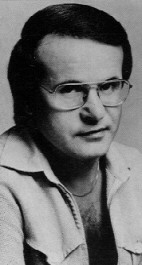
Dominic (Meco) Monardo (aka Dom Monardo)
was born in Johnsonburg (Pennsylvania, USA) in November 1939. His father
was a trombone player in a small italian band and very early introduced
him into formal music studies. Although Meco wanted to learn drums, his
father made him to change his mind and at age nine he took up trombone,
joining the high school band when he was only in the sixth grade.
In 1957 Meco won a scholarship to
the Eastman School of Music in Rochester (New York). There he started a
jazz band wit Chuck Mangione and Ron Carter. He later joined
the West Point Army Band in the early sixties.
Once out of the Army, Meco played in Kai Winding's four-trombone band, something that led Meco to start working the studios from 1965 to 1974. During that time he started doing some arranging, like the horn section of Tommy James' "Crystal Blue Persuasion" and several TV commercials (like the Neil Diamond's series of Coke commercials).
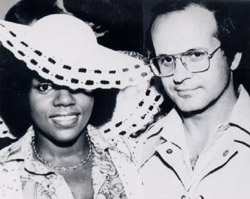
Then, in 1974 he co-produced with
Tony Bongiovi and Jay Ellis his first hit: Gloria Gaynor's
"Never can say goodbye", arranged by Harold Wheeler and City
Life. If you hear to the instrumental section of this great Disco anthem,
you will discern the magic touch of the famous Meco- Tony- Harold team.
This was followed by Carol Douglas' "Doctor's Orders". Curiously,
if you get this record you won't find Meco in the credits. Because of contractual
obligations Meco only appears as conductor and arranger in the credits
of "Baby, don't let this good love die", whereas "Doctor's orders"
appears as arranged and conducted by Lew Del Gatto and written by
Stephens, Greenaway and Cook.

Producing lasted only three years
and after one more year, Meco saw Star Wars on the opening day. He was
so impressed by the film that he alledges to have seen it four times more
on the second day and more through the weekend. Listening to the score
he got the idea of producing a disco version (in the samples section
there is a 1980 interview where you can listen to Meco himself telling
the story).
Meco contacted Neil Bogart at Casablanca Records and
explained his idea, but he was not interested. However, the big success
of Star Wars made Bogart to change his mind and put Meco in contact with
Jimmy Ienner at Millenium. Meco joined Tony Bongiovi and
brought in Harold Wheeler (part of the team responsible for Gloria
Gaynor's "Never can say goodbye").  They
worked together and in just three weeks they arranged the score and recorded
the disco version of Star Wars, including the single and Other Galactic
Funk. The band or rather the orchestra was named MECO. The single outselled
the original soundtrack by John Williams and Meco was nominated as "Best
Instrumental Pop performer" in 1977 (by the way, the prize was won by John
Williams... funny). The success of this recording made Meco to keep doing
"Meco-ized" versions of film scores from 1977 until 1983. In 1982 he also
co-produced the first solo album of Kenny G, and in 1985 he and Harold
Wheeler also produced a "Hooked-on" album for K-Tel. Take a look at the
discography section for a full story of the productions of Meco Monardo
as MECO.
They
worked together and in just three weeks they arranged the score and recorded
the disco version of Star Wars, including the single and Other Galactic
Funk. The band or rather the orchestra was named MECO. The single outselled
the original soundtrack by John Williams and Meco was nominated as "Best
Instrumental Pop performer" in 1977 (by the way, the prize was won by John
Williams... funny). The success of this recording made Meco to keep doing
"Meco-ized" versions of film scores from 1977 until 1983. In 1982 he also
co-produced the first solo album of Kenny G, and in 1985 he and Harold
Wheeler also produced a "Hooked-on" album for K-Tel. Take a look at the
discography section for a full story of the productions of Meco Monardo
as MECO.
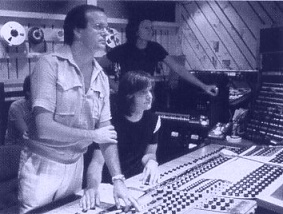
As Meco says "When disco was new, it
was fresh and exciting because it was different. But pretty soon it became
too cookie-cutter and wore itself out". Meco left the music business temporarily
in 1985 and after three years "doing nothing but playing golf" started
to work as a commodities broker in Florida.
More recently he had conversations
to prepare the movie soundtrack for a big-screen version of the TV series
Hawaii 5-0 (listen to the second Meco interview in the samples section).
He has also coproduced a record in 1999 for Yamira (www.yamira.com)
where Lance Quinn and Harold Wheeler also participated as arrangers. The
return of the Star Wars saga to the big screen and the great support provided
by the MECO fans from this webpages convinced Meco to return in 2000 with
"The Complete Star Wars Collection" and he has promised "to be there" for
the next Star Wars films.
If you want to find some more about
Meco, you can read an exclusive interview he conceded for this webpage
in October 99. Just click HERE.
When this website appeared, there was a 70's retro-revival on its way: reissues of classic disco hits, movies, etc. Everybody was talking about Disco... and it was funny to see the ideas that all the "younger" people (I mean, those that were born when Disco was already old) had about the Disco scene and its music. For example, if you buy a 90's Disco compilation you'll find easily songs like Village People's "YMCA" or ABBA songs which are no Disco whatsoever. Some even think Bee Gees are a Disco group!. I guess they just think that nearly all the 70's Dance music was Disco. Well, I'm not a Disco guru, so perhaps some of my view on the subject are not very correct, so don't take them too seriously. They are just the opinion of someone who was a teenager during the "Last days of Disco" and who liked mainly the instrumental side of this kind of music.
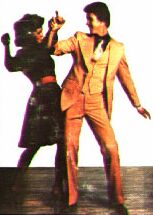
The first question is: What is Disco Music? Let's start with the word. Apparently, the word "Disco" was first used in Europe, from the word "Discoteque" in French or "Discoteca" in Spanish and Italian. "Discoteque" or "Disco" in its shorter version, was used in the States shortly after. From there it also came "Disco Music" (i.e. the Music you dance at the Disco"). Who knows! The point is that Disco Music was something meant for dancing on a disco floor.
Disco, as presented in several movies from Saturday Night Fever to Studio 54, seems to represent a kind of culture, but I don't think this is very accurate. Perhaps for some it was so, but for many of us it was just a different kind of music that we liked. For this reason, I won't tell you about the way we dressed in the 70's (see the picture) or funny things like that. I mean, I never dressed the 70's fashion because I liked Disco music, it was just the way people dressed in the 70's! I hope you get my point. Of course, there were things that were typical of Disco, like the way it was danced, but again, that never had any influence on the music itself.
To understand what is the "Disco Sound", it is necessary to know where it came from. In the late sixties the predominant kind of music was Rock & Roll and its variations, but other styles like R&B and Soul were getting more and more popular. However R&B or Soul were slow for dancing and they naturally evolved to faster beats. At the same time this music got more sophisticated, in part thanks to the availability of better sound equipment in the studios. Perhaps the real leap at this point was "The Sound of Philadelphia" which really sounds like a precursor in the early 70's of the Disco Sound. TSOP added for the first time elaborated string and brass orchestrations to somewhat faster versions of R&B/Soul rhythms. However, the TSOP orchestrations of Gumble & Huff (the parents of TSOP) still sounded too mellodic and while some groups like The Three Degrees sounded like precursors of Disco, others kept somehow faithful to R&B (O'Jays) or Soul (Harol Melvin & The Blue Notes). Among the precursors of Disco, MFSB instrumental themes like "TSOP" and "Sexy" really sound like a precursor of MECO's style (by the way, in the latest of MECO works "Hooked on Instrumentals" there is an arrangement of TSOP that you can hear in the samples section). The Philadelphia Sound (and its groups and singers) progressed into Disco by 1973-74 with the first genuine Disco hits like Gloria Gaynor's "You Never Can Say Goodbye", produced by Meco.
From that moment everything was Disco,
from the music itself to TV, movies, fashion... It traveled around the
world and you could find Disco everywhere. It was a kind of music that
was as popular in USA as in Europe (with somewhat different styles). During
the first half of the 70's Disco got more and more sophisticated, featuring
better orchestrations and faster beats. I won't tell you here about Disco
Queens like Donna Summer or Gloria Gaynor, or the miriad of groups that
played Disco around the world. That's a long story and I didn't follow
it closely.
But there were other music tendencies
as well? Sure, and they would "kill" Disco in the 80's. But among them,
I think that the best influence for the Disco music of the late 70's was
Funk or Funky. Groups like Earth, Wind & Fire had a wonderful
and personal rhythm based on very fast rhythm guitar and great brass sections,
not to forget the typical "slap bass" sound. The integration of this sound
into Disco made it to sound a bit less mellodic and more powerful, leading
Disco to the typical dance sound of the late 70's when MECO appeared
in the scene with Star Wars. Disco didn't evolve much afterwards, just
the addition of some technical novelties like the sound of new synthesizers
and electronic drums. In fact, following the discography of MECO is also
a wonderful trip through the evolution of music during that time.
By the late 70's, Disco was approaching its end. The "new" sound wasn't new anymore and other styles that had started by the late 70's took up the place. It was the time of new electronic music (specially popular in Europe) and a new Rock sound (more popular in USA). By the way, from this point Europe and the States departed in tastes about Dance music. Something that lasts until today.
Disco was dead. Or was it? The fact
is that Disco as we knew it in the middle 70's was really dead. What we
have now are mostly revivals like the "new" album of Donna Summer.
However, there are new Dance bands that are very influenced by the Disco
sound and even others like Jamiroquai that use a somewhat stereotyped
view of the Disco sound to produce a kind of Funky-Disco of the 90's, very
similar to the 70's original.